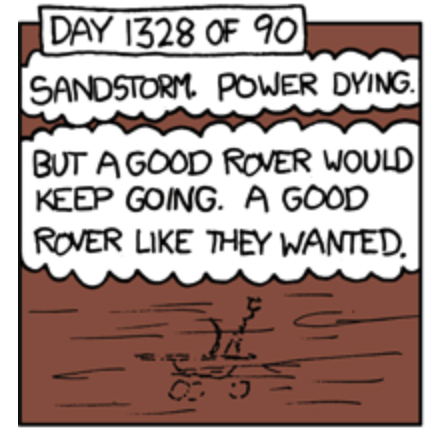Mars rovers tend to be pretty durable, lasting long beyond the mission timelines they’re designed for. As depicted in a terribly sad XKCD comic, Spirit survived for nearly seven years. Opportunity had an even more impressive lifespan of 15 years; both rovers were designed to last only three months. An explanation I’ve heard for why this happens has stuck with me: no one wants to have the piece of the rover that they were responsible for be the one that ends the mission. If you’re the engineer in charge of the battery design, and the battery fails right at the end of the mission timeline, you’ve technically done your job perfectly – but the thought that the rover could have lasted much longer if not for your broken part would still keep you up at night. If enough engineers feel this way, the risk of rover death gets pushed far below the design spec, and the rover has a high chance of surviving a long time.
I was recently reminded of this story when I learned about an explanation for why we age.1 At first glance, the maximum human lifespan seems almost built-in. Even the healthiest people get weaker and more fragile with time, and the effects are clearly visible. The process appears “programmed”: something that happens with a specific cause and for a specific reason. Given humanity’s desire to cheat death, it’s not surprising that a lot of research goes into possible mechanisms of aging, such as telomere decay.2 That research helps us understand the causes of aging. But the reason why these mechanisms exist in the first place is less clear. People who live longer could reproduce more or use their wisdom and experience to increase the odds of survival of their children, just like Mars rovers with long lifespans get to keep doing science. Why wouldn’t the “blind watchmaker” of evolution, given similar incentives to NASA engineers, allow us to live indefinitely if we can avoid serious accidents or disease?
It turns out that a reasonable response to this question has been worked out. It goes like this: everyone is born with some random mutations in their genes. Over long time scales, evolution works because some of these mutations are helpful for survival and get passed along to the next generation. But because our genomes have already been finely tuned by billions of years of natural selection, most random mutations are useless or even harmful. How strongly these bad mutations are selected against depends on when they have their harmful effect. If they kick in early in a person’s lifespan, that person is less likely to successfully reproduce, and the mutated gene will disappear. However, mutations that have a harmful effect later in life can still get passed on to future generations. The net effect of this is that we’re likely to have things go wrong as we age, simply because there isn’t as much evolutionary pressure to prevent them from happening.
This is only compounded by the fact that the longer your life, the more likely you are to run into trouble of one sort of another. If you have a deadly accident, it doesn’t much matter whether your genes could have supported another hundred years of healthy lifespan. This means that the higher the everyday risk of death is, the less valuable longer life is from an evolutionary perspective. A gene that helps a person survive only once they reach 120 has very little worth, because it’s so unlikely they’ll live that long – whether due to external causes, or simply because of the effects of other genes. As a result, many small harmful effects kick in as we get older and the selective pressure against them falters. Together, these many small internal factors add up to the single externally visible process of aging, to the point where it begins to look like there was a built-in lifespan all along.
If this is right, then neither humans nor Mars rovers have true “lifespans.” We’re both incredibly complex systems that can go wrong in many different ways. One day, one of them inevitably catches up with us – but it’s not because we’ve reached some designated end of the road. Individual genes, just like individual engineers, don’t “want” to be responsible for the last straw. But eventually, it’s almost certain that something else will have gone wrong – and as long as a given piece makes it to that point, it can feel secure in the knowledge of a job well done. Read the rest
